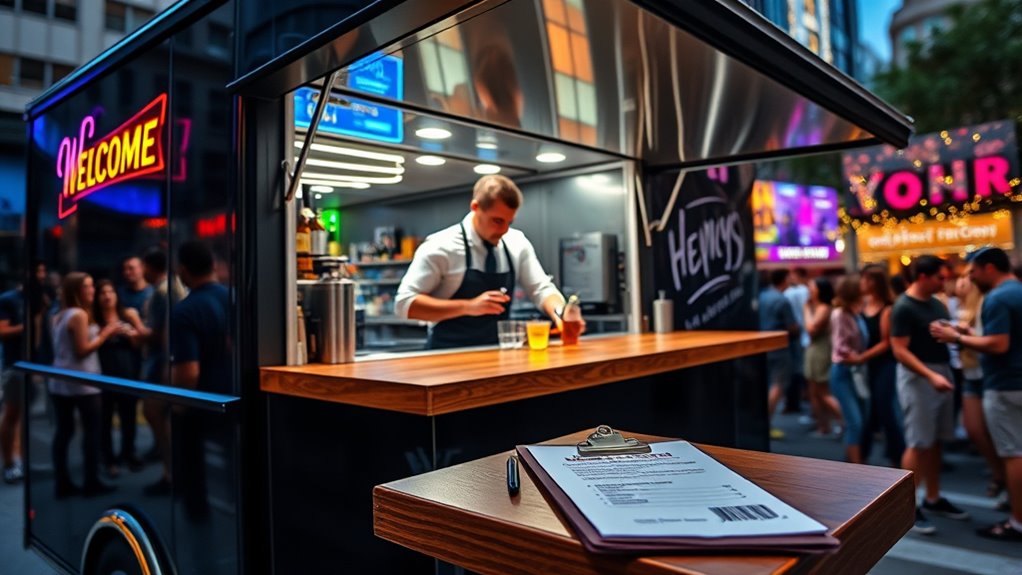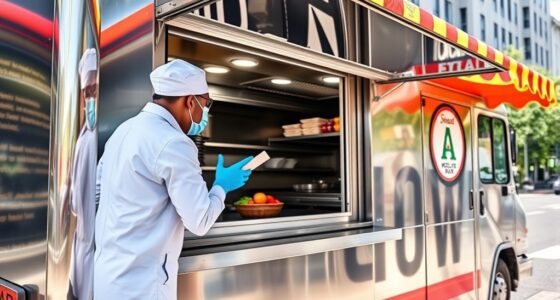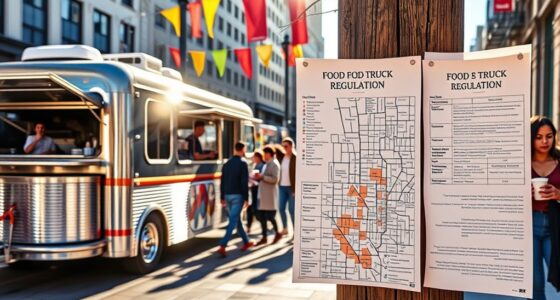To legally operate your mobile bar or beverage truck, you need to obtain the right alcohol permits from local authorities. This includes liquor licenses that specify the types of alcohol you can serve and may require special permits for mobile or temporary sales. You’ll need to submit detailed applications, proof of insurance, and sometimes complete responsible alcohol service training. Staying compliant with these permits and local rules is key—if you want to find out exactly how to get started, keep going.
Key Takeaways
- Obtain the appropriate liquor license specific to mobile or temporary alcohol sales in your jurisdiction.
- Submit detailed application forms along with proof of liability insurance and possibly background checks.
- Comply with local regulations regarding permitted operating hours, event types, and locations for mobile alcohol service.
- Renew licenses as required and stay updated on changes in local alcohol laws and event restrictions.
- Ensure all conditions of your permits are met to prevent penalties, license revocation, or legal shutdowns.

If you’re planning to operate a mobile bar or beverage truck, securing the right alcohol permits is vital to stay compliant with local laws. Without a valid liquor license, you risk hefty fines, legal actions, or even shutting down your operation entirely. The process of obtaining a liquor license can seem complicated, but understanding the basics helps you navigate the requirements more effectively. Local governments often have specific event regulations that dictate how and when alcohol can be served, and these rules vary widely depending on your location. You’ll need to research these regulations early to guarantee your mobile bar complies with all relevant laws.
Securing proper alcohol permits is essential for legal mobile bar operations and compliance with local laws.
The first step is to identify the type of liquor license you’ll need. Different licenses permit different alcohol-related activities, such as serving beer and wine or full spirits. Many jurisdictions require you to apply for a special license designed explicitly for mobile or temporary alcohol sales. These licenses often come with strict conditions, including limits on the hours you can serve alcohol, the types of events where alcohol can be sold, and the locations where you’re allowed to operate. Failing to adhere to these event regulations can lead to penalties or loss of your license.
Applying for a liquor license usually involves submitting detailed paperwork, including proof of liability insurance, background checks, and sometimes a detailed plan of your mobile operation. You might also need to provide documentation of your training or certification in responsible alcohol service. Local authorities may also require you to attend an interview or public hearing to explain your operation and how you’ll guarantee compliance with event regulations. It’s vital to be thorough and accurate in your application to avoid delays or rejection.
Keep in mind that obtaining a liquor license isn’t a one-time process. Many jurisdictions require renewal and ongoing compliance checks. You’ll need to stay updated on any changes to local laws or event regulations that could impact your license status. Additionally, if you plan to host special events or operate in different areas, you may need to acquire multiple licenses or special permits. Always verify the requirements for each location to avoid legal issues.
Frequently Asked Questions
Can Mobile Bar Permits Be Transferred Between Owners?
No, mobile bar permits generally can’t be transferred between owners. You need to go through an ownership transfer process, which involves updating permit eligibility with the issuing authority. This guarantees the new owner meets all licensing requirements and maintains compliance. You should contact your local licensing agency to understand specific steps, as procedures vary by location. Failing to follow proper transfer protocols could result in permit suspension or revocation.
Are There Different Permit Requirements for Wine and Spirits?
Yes, you need different permits for wine and spirits. Wine regulations often involve specific licensing that allows you to serve or sell wine, while spirits licensing covers stronger alcohols like whiskey or vodka. These requirements vary by state and locality, so you should check local regulations to guarantee compliance. Obtaining the correct permits helps you legally serve both wine and spirits, avoiding fines and penalties.
How Long Does It Take to Process a Mobile Bar Permit?
Processing your mobile bar permit application typically takes anywhere from 2 to 8 weeks, depending on the state and completeness of your documents. It may feel like an eternity, but staying patient and ensuring your application is thorough speeds things up. Keep in mind that the processing timeline varies, so check with your local authority for the most accurate estimate. Prompt responses to any requests can help expedite the process.
Are Special Permits Needed for Outdoor Events?
Yes, you usually need outdoor event licensing and temporary alcohol permits for outdoor events. These permits guarantee you comply with local laws and allow you to serve alcohol legally. You should check with your city or state authority, as requirements vary. Applying early helps. Make sure to provide details about the event, location, and duration to get your permits processed smoothly and avoid any legal issues during your outdoor celebration.
What Are the Penalties for Operating Without a Permit?
If you operate without a permit, you face serious legal consequences. Permit violations can lead to hefty fines, license suspensions, or even criminal charges, depending on your location. Authorities may shut down your mobile bar or beverage truck immediately, and dealing with these legal issues can be costly and time-consuming. Always make certain you secure the necessary permits beforehand to avoid these penalties and keep your business compliant.
Conclusion
Getting the right alcohol permits is like planting seeds for a thriving event garden—you nurture your plans with the proper paperwork, and success blooms. Without them, your mobile bar could face storms that threaten to uproot your efforts. So, stay diligent and follow the rules; your efforts will blossom into memorable moments. When you secure your permits, you’re not just ticking boxes—you’re laying the foundation for a vibrant celebration that will leave a lasting impression.









